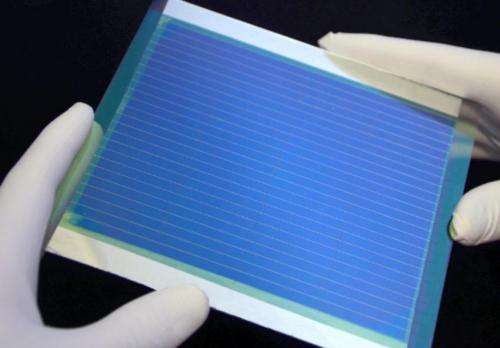Imec demonstrates organic photovoltaics modules showing excellent optical properties, high efficiencies

At this week's European Photovoltaic Solar Energy Conference and Exhibition (EU PVSEC 2014), nanoelectronics research center imec presents a fullerene-free organic photovoltaic (OPV) module of 160cm2 achieving a conversion efficiency above 5 percent, and a semi-transparent OPV module with an efficiency above 4.5 percent. With both modules showing excellent electrical and optical properties, imec's latest achievement in the upscaling of OPV cells into highly efficient and stable modules is an important step in realizing the product development of organic photovoltaics.
The fullerene-free OPV module was created by thermally evaporating small molecules in different active layers. The process has been shown to improve the device stability, while at the same time opening up possibilities for further device engineering. The introduction of a new acceptor material allows for the application of new classes of organic materials as photoactive layers to improve the conversion efficiency. The fullerene-free OPV module achieved efficiencies of more than 5 percent in an opaque configuration on a glass substrate. Moreover, a performance of 8.4 percent in a single cell with 1cm2 active area was demonstrated under solar spectrum illumination – the highest ever achieved with a non-fullerene acceptor-, while under indoor light exposure, the device shows an efficiency as high as 24 percent.
The semitransparent OPV module, based on a polymer-fullerene blend, and using systems of metal oxide layers and thin metal films as transparent electrical contacts, achieved power efficiencies above 4.5 percent. This module effectively combines double glass window properties with device encapsulation, as such increasing life time and enabling window-integrated photovoltaic solutions.
"Imec's research on organic photovoltaics largely encompasses fundamental research on increasing efficiency and lifetime, as well as application-oriented work, developing solutions for window-integration and indoor use," said Tom Aernouts, R&D manager for thin-film photovoltaics at imec. "The high conversion efficiencies under various light conditions are important achievements in the development of marketable solutions for organic photovoltaics."
Imec's research into thin-film photovoltaics is part of the Solliance initiative. The development of a fullerene-free OPV process received funding from the European Community's Seventh Framework Programme (FP7/2007-2013) under Grant Agreement 287818 (X10D).
Provided by IMEC



















